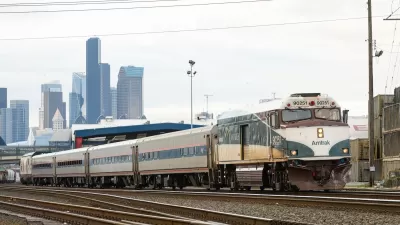As we move into a 2009 full of staggering urban challenges - economic, environmental, social, and leadership challenges - do our planning departments have the passion, creativity and leadership to be what our cities need them to be?
As we move into a 2009 full of staggering urban challenges - economic, environmental, social, and leadership challenges - do our planning departments have the passion, creativity and leadership to be what our cities need them to be?
Those who've read my blog from the beginning, may remember my first post, on the state of North American planning departments and planning schools. Earlier this month, when I had the honour of speaking to the year's largest "captive audience" in Canadian planning as the feature speaker at the Annual Toronto Planning Dinner, I chose a similar topic, a respectful but candid "call for change" in Canadian planning departments.
Would you say your local planning department exhibits passion and creativity in its work? As Jaime Lerner, city-planner/architect and now-legendary former Mayor of Curitiba Brazil, puts it, does your civil service exhibit energy, or excuse? Is it a persuasive champion for progressive and sustainable city-building? Or do you think these words should be associated only with political leaders, not civil servants? I hope some good dialogue results from this - we need it.
Perhaps in the New Year I'll find some time to turn my speech into a longer post. In the meantime though, here's a resulting article from Novae Res Urbis, a great Toronto-based planning "e-magazine":
NovæResUrbis - GTA edition
WEDNESDAY • DECEMBER 3 • 2008
TIME FOR CHANGE
Passionate planning neededBorrowing rhetoric from American president-elect Barack Obama, City of Vancouver planning director Brent Toderian said the planning profession needs change. "We need to be much more persuasive, much more creative, more dogged and passionate than frankly our profession has been," Toderian told the crowd of 830-planning professionals gathered at the Royal York Hotel for the 18th annual University of Waterloo planning alumni of Toronto dinner, Monday night. "I believe planning departments across the country need to be thought-leaders, partners of politicians we tend to be too passive as a profession and not nearly passionate enough about what real progressive city building is and needs to be."
A graduate of the Waterloo planning program, Toderian was the first person in the annual event's history to attend the dinner as a student, as an alumnus and then return as a speaker. He has been called an "urban firecracker" by the Globe and Mail and is a passionate advocate for creative city building, working in Ontario, Calgary and now Vancouver.
Toderian admitted that he could have talked about specific projects from his planning department or planning for the 2010 Olympic Games, but instead he decided to bend the ear of his target audience and inspire change.
He said there is a new generation of planners-a creative wave-knocking on the door. "Planning departments are not regulators, we're not rule defenders, we're not merely passive followers of politicians or community and we're not poll-takers," he said. "We are professional and persuasive voices in progressive, sustainable city building, creative and engaged listeners and leaders. We need different planning departments across the country with a much stronger sense of urbanist leadership, more of a design background and much better at strategic thinking."
In a challenging tone, Toderian asked: are planning departments prepared for the next generation of leadership?

Planetizen Federal Action Tracker
A weekly monitor of how Trump’s orders and actions are impacting planners and planning in America.

Chicago’s Ghost Rails
Just beneath the surface of the modern city lie the remnants of its expansive early 20th-century streetcar system.

San Antonio and Austin are Fusing Into one Massive Megaregion
The region spanning the two central Texas cities is growing fast, posing challenges for local infrastructure and water supplies.

Since Zion's Shuttles Went Electric “The Smog is Gone”
Visitors to Zion National Park can enjoy the canyon via the nation’s first fully electric park shuttle system.

Trump Distributing DOT Safety Funds at 1/10 Rate of Biden
Funds for Safe Streets and other transportation safety and equity programs are being held up by administrative reviews and conflicts with the Trump administration’s priorities.

German Cities Subsidize Taxis for Women Amid Wave of Violence
Free or low-cost taxi rides can help women navigate cities more safely, but critics say the programs don't address the root causes of violence against women.
Urban Design for Planners 1: Software Tools
This six-course series explores essential urban design concepts using open source software and equips planners with the tools they need to participate fully in the urban design process.
Planning for Universal Design
Learn the tools for implementing Universal Design in planning regulations.
planning NEXT
Appalachian Highlands Housing Partners
Mpact (founded as Rail~Volution)
City of Camden Redevelopment Agency
City of Astoria
City of Portland
City of Laramie






























